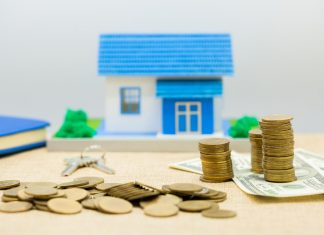You’ve done it! Finally, you own your own place. No more worrying about rents and landlords. You can now renovate or upgrade your place however you like.
With no security deposits at stake, you can hang pictures with impunity and paint your walls fuchsia if you want.
While the idea of being a first-time homeowner is undoubtedly thrilling, it comes with a set of responsibilities. Your home is like a child, which must be cared for properly.
This may be a lifelong investment, so keep it maintained so you get a good return on your hard-earned money.
The list of things you can do to your home is endless, which means you’ll need to prioritize. The goal is not only protecting your investment, but also creating a space where you can truly thrive.
By taking these four proactive steps, you can keep your home in top-notch condition in a feasible and sustainable manner.

#1. Invest in Energy Efficiency
Depending on the house you buy, one of the first steps you take could be replacing outdated appliances and mechanical systems.
This is your golden chance to invest in energy-efficient devices, which save money and reduce your carbon footprint.
Whether it’s a mini split or a new washer, energy-efficient equipment is more reliable and economical in the long run.
Being mindful of energy efficiency when appliance shopping can significantly reduce your utility bills. For example, dishwashers that were once notorious for wasting water are now equipped with soil sensors.
These new models can detect how dirty your dishes are and then use just the right amount of water to wash them. As for HVAC systems, advanced technology allows you to control them with apps.
You’ll never again have to worry that you left the AC running full blast while you’re away.
#2. Prepare for Repairs
While your house may have been in tip-top shape when you bought it — your inspection saw to that — it won’t stay that way forever.
Whether high winds detach a gutter or an errant baseball breaks a window, your home will inevitably require repairs. When that day arrives, you’ll be amazed at how much you can save by having acquired some basic repair skills.
Learn how to fix a leaky faucet, replace a light switch, or unclog a toilet. There are plenty of online videos to help you gain these skills.
As a homeowner, you’ll often find yourself needing basic tools for repairs and maintenance. Invest in a good set of quality tools and safety gear like eye goggles and dust masks — but also know your limits.
There will be occasions when it’s best to call in the pros so you don’t end up making matters worse. For such times, build a network of trusted professionals, such as a plumber, an electrician, and a handyman.
Having reliable experts at hand can save you time and stress when you need repairs or renovations.
#3. Don’t Forget the Outdoors
Be aware that the outside of your house may need more maintenance than the inside. You’ll need to regularly mow the lawn, trim the bushes, and keep planting beds free of weeds.
Tree limbs and branches that are weak may fall and cause harm, so remove them immediately. If you have nosy neighbors, consider planting trees and shrubs to create a privacy border.
A well-kept yard not only enhances your home’s curb appeal, but also adds value to your property.
No one wants uninvited guests in their gardens, especially the four-legged ones. The first rule of preventing pests is to get rid of any yard debris where they can hide and feed.
Regular pest control is essential to prevent infestations. Keep an eye out for signs of pests, such as droppings or chewed wires, and address them promptly.
Consider hiring a professional pest control service for annual inspections and preventive treatments.
#4. Follow a Maintenance Schedule
A well-maintained home is a safe home. Dust and dirt can accumulate over time, leading to wear and tear on surfaces and appliances.
Develop a practical cleaning routine, paying special attention to often-neglected areas like vents, air filters, and refrigerator coils. Be proactive and lubricate the moving parts of your garage door to prevent damage and ensure proper functioning.
Safety is vital, so don’t forget to test smoke alarms and carbon monoxide detectors monthly.
The same principles apply to the outside. Your maintenance schedule should include tasks like cleaning gutters, checking the AC compressor, and inspecting the roof.
Power-wash your windows and siding at least once a year. It extends the life of the siding, so you won’t need to replace it as often.
A well-maintained home both looks better and prevents more significant and costly issues from arising.
#5. Enjoying Your Biggest Investment
Owning a home comes with recurring expenses, from property taxes to utilities and maintenance costs. A well-planned budget helps manage your finances and ensures you enjoy your new home without additional financial stress.
Save for possible upgrades in the future, such as a kitchen or bathroom remodel. Having a financial cushion for these expenses may make them less daunting when the time comes.
Becoming a homeowner is rewarding, but it can also be time- and cash-consuming. Given that your home is your most prized possession, though, strive to enjoy taking care of it.
If you take pride in it today, it will return the favor for years to come.
Related Posts:












